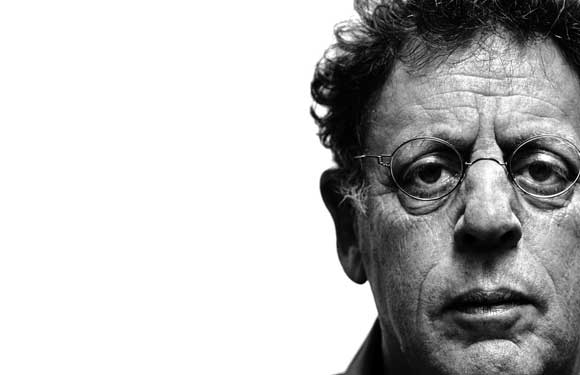Boston Landmarks Orchestra offers a world premiere and a Glass concerto half full

Two movements of the “Concerto Fantasy” for Two Timpanists and Orchestra by Philip Glass were performed by the Boston Landmarks Orchestra Wednesday night.
Say what you will about the repetitive nature of Philip Glass’s music, but the American composer’s works are finely crafted and move with a seamless flow. Yet even for one so well versed in the technique of composition, it can still take time to find the way with a new piece.
That was the case with Glass’s Concerto Fantasy for Two Timpanists and Orchestra. Written for timpanist Jonathan Haas and premiered by Haas and Svetoslav Stoyanovby with the American Symphony Orchestra in 2000, the work took the composer ten years to complete.
One wouldn’t know it from listening to the piece, which has quickly become the most famous timpani concerto in the repertoire. The work is characteristic Glass, replete with simple, though catchy melodies and driving rhythmic vitality.
The work, or at least part of it, made its overdue New England premiere at the Hatch Shell Wednesday night as part of a wide-ranging concert given by Christopher Wilkins and the Boston Landmarks Orchestra.
Free concerts sometimes offer truncated performances of works such as this one, and Wednesday night Wilkins led the orchestra in only the second and third movements of Glass’ concerto.
Though not complete, the performance was a high-energy affair, with orchestra and soloists—timpanists Jeffrey Fischer and Robert Schulz—delivering the goods to bring Glass’s score to life.
Wilkins shaped the lines and rollicking figures of the second movement into phrases of intensity. The third movement was played with driving momentum, and the Landmarks musicians put across the gnarly cross rhythms with bite and energy.
The cadenza featured the timpanists at their most spectacular as the music called for Fischer and Schulz, playing twelve timpani between them, to trade passages that resulted in a wall of rolling thunder. The performance was also a spectacle for the eyes as the musicians deftly wheeled their way around 180 degrees to reach the drums.
A fine performance such as this one left listeners wanting more, and hopefully the Landmarks Orchestra or another ensemble in the Boston area will perform the Concerto Fantasy in its entirety in the near future.
Wednesday night’s concert also featured the world premiere of Donald Krishnaswami’s The Swordfishers.
Composed for orchestra and a choir of log drums and lithophones—stone instruments that resonate when struck—The Swordfishers is a musical reimagining of the lives of the Red Paint People, an indigenous civilization that extended from the Gulf of Maine to Labrador between 9,000 and 4,000 years ago.
Krishnaswami’s score captures the serenity and wrath of an archaic natural world and the thrill of the title hunt for an oversized swordfish. The music is richly dramatic in effect, evolving from sheens of string sound to dense swirls of wind and brass figures. At its climactic points, the orchestral sound crests and falls like waves.
The lithophones used in this performance were modern twists on the ancient instruments, which were too priceless to use. The orchestra’s percussionists and young members of the Yawkey club of Roxbury instead played instruments fashioned from stone work from tabletops and stone materials found in dumpsters.
The sound these instruments produced was an ear-tingling mix of clangs and clops, sonorities that provided rhythmic energy to Krishnaswami’s robust scoring. The percussionists played with commitment, and Wilkins sculpted the lines of the work into coherent paragraphs of sound, giving bold advocacy to the work.
Filling out the remainder of the evening’s offerings were popular pieces by Khachaturian and Rachmaninoff.
The latter’s Symphonic Dances has been a regular item on concerts in Boston over the past few seasons, with the Boston Symphony Orchestra and New England Philharmonic offering their own renditions of this well-traveled warhorse.
Wilkins and the Landmarks musicians focused on the big picture. The conductor, leading with a mix of deliberate and sweeping gestures, coaxed subtle crescendos and rubato phrases from the orchestra. The first movement emerged with bold precision, with Wilkins drew out the fortissimo hits to fine effect.
At times, details in this reading were a little cloudy. The second movement glided along in a stately tempo, though one wanted a little more freedom in the phrasing. But as the movement continued the musicians found that missing freedom to add a touch of schmaltz to this macabre waltz, the lines of the music rolling in smoothly crafted phrases.
Wilkins mined the mystery from the opening of the third movement, and, in general, the musicians answered with clarity and focus. Some untidy string playing, though, crept into the quicker passages and the sidewinding theme in the lower strings could have used more bite.
The sharpest performance from the orchestra came by work’s end, where Wilkins drew playing of fire and energy for a rousing conclusion. The quotation of the Dies Irae sounded with power.
Wilkins and the orchestra opened the concert with a sparkling rendition of Khachaturian’s “Sabre Dance” from Gayane. Kudos to saxophonist Kenneth Radnofsky, who floated a tender-phrased solo in the work’s central section.
Christopher Wilkins and the Boston Landmarks Orchestra will perform Mendelssohn’s A Midsummer Night’s Dream to accompany a fully staged production of the Shakespeare play given by the Commonwealth Shakespeare Company 7 p.m. Wednesday at the DCR Hatch Shell. landmarksorchestra.org
Posted in Performances




Posted Aug 23, 2015 at 8:56 am by Dick Stoltzman
Yea Bob! Glass is a lucky guy.